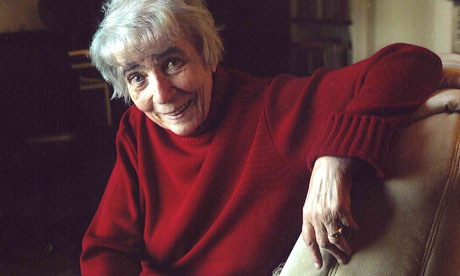Christine Brooke-Rose (1923-2012)
So sad to hear about the passing of Christine Brooke-Rose. What a radiant shining light glimmering above the slog! We can’t imitate the wordplay (“affrodizzyacts,” though we try). Her words: “Let us play: there are more theories in heaven and earth.” Her friend Roland Barthes’s words: “The writerly text is ourselves writing, before the infinite play of the world is traversed, intersected, stopped, plasticized by some singular system (Ideology, Genus, Criticism) which reduces the plurality of entrances, the opening of networks, the infinity of languages.” Who said it best?
Amid the sadness, though, a chance to revisit the life:
(we bullet)
- remembrances up at the Guardian (by Natalie Ferris), htmlgiant (by A. D. Jameson, along with a solid introduction to her work), and the PN Review. Lots of shout-outs popping up on blogs, like this lovely, brief post (“christine brooke-rose, rock star, wildwoman”) from writer-critic Kate Zambreno (who, like us, counted Brooke-Rose among her heroes)
- among all this, wonderful revisits of her novels and essays (Jameson is especially apt in calling-out Such (an imagined Oppenheimer-ian end-game) and Thru (better than William Gaddis rewriting J R as the collective sigh of a polyvocalized writing workshop); Zambreno points us to B-R’s essay “Illiterations,” which reminds us that new forms produce new ways of “looking”: and Ferris hits home with a line true to Brooke-Rose’s prowess: “As a critic in the Empsonian line of the time, she is lively and crystalline, testing out the academic lacerations to language that would comprise her artful, prankster lyricism.”
- it’s worth calling out Brooke-Rose the critic, and Brooke-Rose the critic of Ezra Pound, as another powerful modality the writer explored. Her book A ZBC of Ezra Pound is one of the best we’ve read on the poet, and triggers her University of Chicago Press connection: in 1992, we published The Modern Movement: A TLS Companion (edited by John Gross), which samples her essay on Pound “His Name in the Record.” Some serious prescience follows below:
“There is a timeless, apocalyptic quality in Mr Pound’s poetry which one suspects even his adverse critics find disturbing, but which most poets respond to, even if they do not understand. Who knows, his may be the only comprehensible poetry to the twenty-first century, under a new economic order, undreamt of now. We may, for that matter, all be speaking Chinese in western Europe then, and thinking ideogrammatically, with nothing left of older civilization but the fragments he shored against our ruin. It might just possibly be he who will ‘have his name on record . . . Thrones, courage.'”
—from B-R’s review of Pavannes and Divagations: Thrones: 96–109 de los cantares (June 10, 1960)
Brilliant. Often hilarious. Always sharp, sometimes biting, but never closed-off to new forms, new worlds. We’ll miss her.
